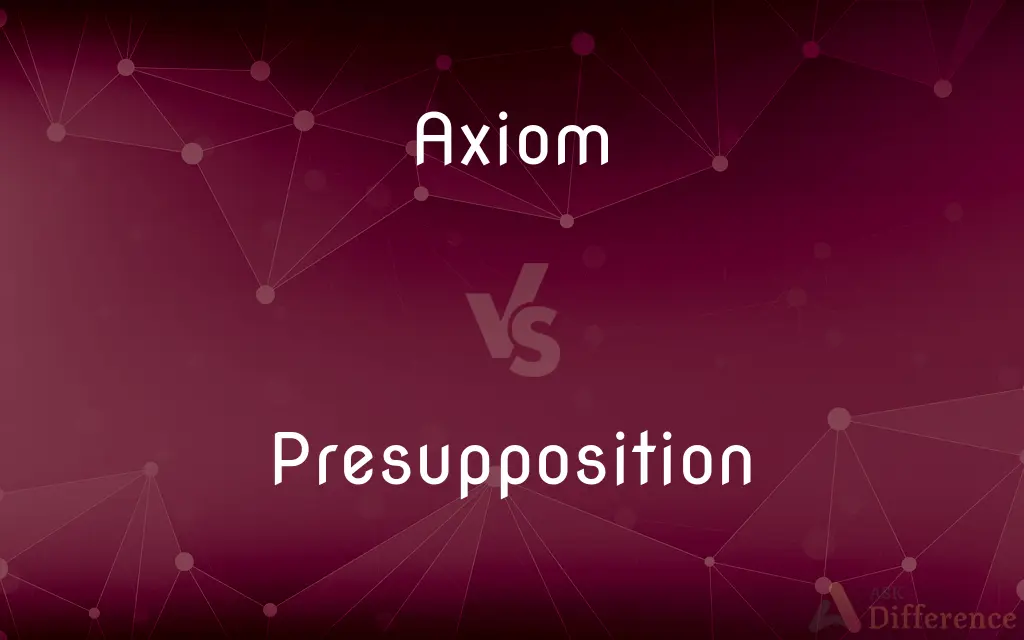Axiom vs. Presupposition — What's the Difference?
By Tayyaba Rehman & Fiza Rafique — Updated on March 11, 2024
Axiom and presupposition are foundational concepts in logic and reasoning, but they serve different roles in the construction of arguments and theories.

Difference Between Axiom and Presupposition
Table of Contents
ADVERTISEMENT
Key Differences
An axiom is a statement or principle that is accepted as universally true without proof, often serving as a starting point for further reasoning and theoretical development. Presupposition, on the other hand, refers to an assumed or implied condition that must be true for the argument or statement in question to make sense.
Axioms are foundational in fields such as mathematics, logic, and certain scientific disciplines, where they underpin theorems and principles derived from them. Presuppositions are not always explicitly stated but are necessary for the coherence and validity of an argument or discourse. They can exist in everyday language, communication, and various areas of study, and their identification is crucial for critical analysis.
While an axiom is deliberately chosen and explicitly stated as a foundational truth for a formal system, presuppositions might not be as clearly defined or acknowledged, often embedded within the context or language of a statement. The identification and examination of presuppositions are essential in fields such as linguistics, philosophy, and critical theory, where understanding the underlying assumptions of discourse is crucial.
The distinction between axiom and presupposition highlights the difference between foundational truths that are established as starting points in formal systems and underlying assumptions that must be inferred and examined within arguments and discourse. Recognizing this distinction is key to navigating complex arguments, theories, and communications effectively.
Axioms are foundational truths accepted without proof in formal systems, while presuppositions are underlying assumptions that must be true for an argument or statement to be coherent. Both concepts play critical roles in the structure and analysis of knowledge, though they operate in different contexts and with different levels of explicitness.
ADVERTISEMENT
Comparison Chart
Nature
A universally accepted starting truth without proof
An assumed or implied condition necessary for an argument
Usage
Foundational in formal systems like mathematics and logic
Embedded in language, arguments, and various areas of study
Explicitness
Deliberately chosen and explicitly stated
Often not clearly defined or acknowledged
Role
Underpins theorems and principles in formal systems
Ensures the coherence and validity of arguments
Fields
Mathematics, logic, certain scientific disciplines
Linguistics, philosophy, critical theory, and more
Compare with Definitions
Axiom
A self-evident truth that requires no proof.
In Euclidean geometry, the statement that through any two points, there is exactly one straight line is considered an axiom.
Presupposition
Often implicit and not directly stated.
His argument carried the presupposition that all forms of government intervention are negative.
Axiom
Serves as a foundational building block for further reasoning.
The axioms of arithmetic form the basis for all mathematical operations.
Presupposition
An underlying assumption that must be true for the statement to hold.
The question 'Have you stopped going to the gym?' presupposes that the person was going to the gym in the first place.
Axiom
Universally accepted within a particular domain.
The axiom of choice is a fundamental principle in set theory.
Presupposition
Can be challenged to deconstruct arguments.
By questioning the presuppositions of the study, she exposed its inherent biases.
Axiom
Critical for developing theoretical frameworks.
His new theory was built on a set of clearly defined axioms.
Presupposition
Critical for understanding context and meaning.
Analyzing the presuppositions of a text reveals the author's unstated beliefs.
Axiom
Immutable within its system, though different systems may have different axioms.
Non-Euclidean geometries are based on axioms that differ from Euclid's postulates.
Presupposition
Plays a significant role in communication and discourse analysis.
The presupposition that technology always leads to progress often goes unexamined in discussions about innovation.
Axiom
An axiom, postulate or assumption is a statement that is taken to be true, to serve as a premise or starting point for further reasoning and arguments. The word comes from the Greek axíōma (ἀξίωμα) 'that which is thought worthy or fit' or 'that which commends itself as evident.'The term has subtle differences in definition when used in the context of different fields of study.
Presupposition
In the branch of linguistics known as pragmatics, a presupposition (or PSP) is an implicit assumption about the world or background belief relating to an utterance whose truth is taken for granted in discourse. Examples of presuppositions include: Jane no longer writes fiction.
Axiom
A statement or proposition which is regarded as being established, accepted, or self-evidently true
The axiom that sport builds character
Presupposition
To believe or suppose in advance
"In passing moral judgments ... we presuppose that a man's actions, and hence also his being a good or a bad man, are in his power" (Leo Strauss).
Axiom
A self-evident or universally recognized truth; a maxim
“It is an economic axiom as old as the hills that goods and services can be paid for only with goods and services” (Albert Jay Nock).
Presupposition
To require or involve necessarily as an antecedent condition
"The term tax relief ... presupposes a conceptual metaphor.
Axiom
An established rule, principle, or law.
Presupposition
An assumption made beforehand; a preliminary conjecture or speculation.
Axiom
A self-evident principle or one that is accepted as true without proof as the basis for argument; a postulate.
Presupposition
The act of presupposing.
Axiom
(philosophy) A seemingly self-evident or necessary truth which is based on assumption; a principle or proposition which cannot actually be proved or disproved.
Presupposition
(linguistics) An assumption or belief implicit in an utterance or other use of language.
Axiom
A fundamental assumption that serves as a basis for deduction of theorems; a postulate (sometimes distinguished from postulates as being universally applicable, whereas postulates are particular to a certain science or context).
Presupposition
The act of presupposing; an antecedent implication; presumption.
Axiom
An established principle in some artistic practice or science that is universally received.
The axioms of political economy cannot be considered absolute truths.
Presupposition
That which is presupposed; a previous supposition or surmise.
Axiom
A self-evident and necessary truth, or a proposition whose truth is so evident as first sight that no reasoning or demonstration can make it plainer; a proposition which it is necessary to take for granted; as, "The whole is greater than a part;" "A thing can not, at the same time, be and not be."
Presupposition
The act of presupposing; a supposition made prior to having knowledge (as for the purpose of argument)
Axiom
An established principle in some art or science, which, though not a necessary truth, is universally received; as, the axioms of political economy.
Axiom
A saying that widely accepted on its own merits
Axiom
(logic) a proposition that is not susceptible of proof or disproof; its truth is assumed to be self-evident
Common Curiosities
What is an axiom?
An axiom is a universally accepted principle or statement in a formal system, taken to be true without proof.
Do all fields of study use axioms?
Not all fields explicitly use axioms. They are most common in formal systems like mathematics and logic.
Can a presupposition be false?
A presupposition can be false or challenged, which can lead to questioning the validity of the argument that depends on it.
How do presuppositions affect communication?
Presuppositions can significantly affect communication by shaping assumptions and expectations, potentially leading to misunderstandings if not shared by all parties.
Can the same statement be both an axiom and a presupposition?
In different contexts, a statement might function as an axiom in a formal system and a presupposition in an argument or discourse.
Is it possible to have a system without axioms?
Most formal systems require axioms as foundational truths from which other truths are derived, so they are generally indispensable.
Can axioms change over time?
Within a particular formal system, axioms usually remain constant, but different systems or theoretical developments might propose new axioms.
What does presupposition mean?
Presupposition refers to an assumption that is taken for granted and must be true for an argument or statement to make sense.
Can axioms be questioned or disproved?
Within their specific formal systems, axioms are generally not questioned. However, different theoretical frameworks might adopt different axioms.
How are presuppositions identified in an argument?
Identifying presuppositions often involves analyzing the context, language, and implications of statements to reveal implicit assumptions.
Are axioms the same as laws or theories?
Axioms differ from laws or theories in that they are foundational assumptions not derived from empirical evidence but are necessary for the system's logic.
How do presuppositions relate to bias?
Presuppositions can reflect biases by revealing the unexamined assumptions that inform an individual's or group's perspective.
Are axioms always true?
Axioms are accepted as true within the context of their specific formal systems but are not empirical truths that can be tested or observed.
How do presuppositions impact critical thinking?
Understanding and questioning presuppositions is crucial for critical thinking, as it allows individuals to uncover and evaluate the underlying assumptions of arguments.
Why is it important to identify presuppositions?
Identifying presuppositions is important for understanding the full implications of arguments and for critically analyzing the coherence and validity of those arguments.
Share Your Discovery

Previous Comparison
Awol vs. Mia
Next Comparison
Division vs. PartitionAuthor Spotlight
Written by
Tayyaba RehmanTayyaba Rehman is a distinguished writer, currently serving as a primary contributor to askdifference.com. As a researcher in semantics and etymology, Tayyaba's passion for the complexity of languages and their distinctions has found a perfect home on the platform. Tayyaba delves into the intricacies of language, distinguishing between commonly confused words and phrases, thereby providing clarity for readers worldwide.
Co-written by
Fiza RafiqueFiza Rafique is a skilled content writer at AskDifference.com, where she meticulously refines and enhances written pieces. Drawing from her vast editorial expertise, Fiza ensures clarity, accuracy, and precision in every article. Passionate about language, she continually seeks to elevate the quality of content for readers worldwide.
















































